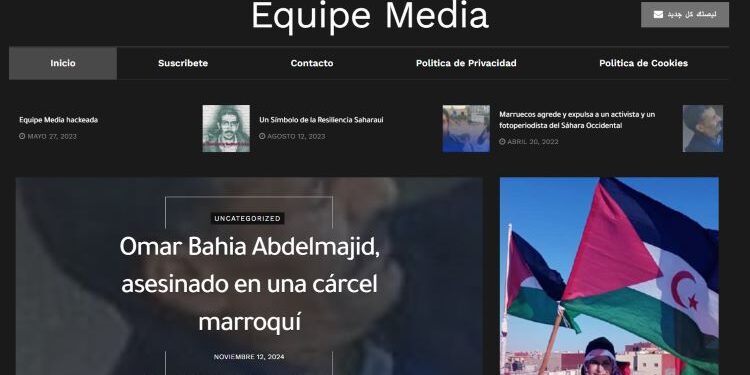Eduardo González
The Ministry of Foreign Affairs has limited itself to recalling the “commitment to the protection and guarantee of human rights” of the Joint Declaration between Spain and Morocco to avoid a question from the Sumar Parliamentary Group, a minority partner in the coalition government, on the persecution of Sahrawi journalists by Rabat.
In a written parliamentary question, Sumar denounces the repression exercised by Morocco against the journalists of the Equipe Media agency, “an independent news agency that works in the occupied territories of Western Sahara and that has been “on the radar of the Moroccan authorities for years”.
In this regard, Sumar recalls the persecution and expulsion of Ahmed Ettanji, Mohamed Mayara, “the most visible leaders of that organization”, and the arrest of Ahmed Bahi, a Sahrawi activist who came out in defense of those expelled.
According to Sumar, the organization Reporters Without Borders has described the situation of journalism in “the territories of the former Spanish colony occupied since 1976 by Morocco” as an “information desert” and has denounced the “persecution and constant repression of Sahrawi reporters who try to do alternative journalism outside the Moroccan officialdom, often sentenced to exorbitant prison sentences”.
For this reason, the party led by Vice President Yolanda Díaz asks the Ministry of Foreign Affairs if it will “issue a protest, verbal note or statement condemning the persecution of journalists such as Ahmed Ettanji or Mohamed Mayara by the Kingdom of Morocco”, if it will take “any measure to prevent Morocco from continuing to act against media and journalists operating in Western Sahara in the future” and if it will “intercede to ensure the health and safety of Sahrawi journalists”.
In its response, signed on November 22 and published this week by the Official Gazette of Congress, the Ministry of Foreign Affairs limits itself to responding that “Human Rights are a guiding principle of the foreign policy of the Government of Spain” and that, “from the Ministry of Foreign Affairs, European Union and Cooperation they are defended and promoted in all countries (…) both bilaterally and through the European Union”-
It also adds that, “in point 3 of the Joint Declaration signed after the High Level Meeting (HLM, with Morocco on February 2, 2022 (it was actually in February 2023), both parties reiterate their commitment to the protection and guarantee of human rights as an essential basis for democratic coexistence, the rule of law and good governance”.
Since the unexpected decision of Pedro Sánchez’s government to endorse, at the beginning of 2022, the Moroccan autonomy plan for Western Sahara, the Spanish authorities have been criticised for their apparent complicity with Morocco on human rights. A few days before the High Level Meeting, the Spanish socialist MEPs voted in the European Parliament against a resolution critical of the human rights situation in Morocco, in the name of “responsibility and in favour of frank bilateral relations based on dialogue and understanding”.
Also on the eve of the High Level Meeting, the Foreign Ministry responded with almost exactly the same words to two questions from the PP on the situation of Sahrawi political prisoners and on the imprisonment of the lawyer, opposition leader and former Minister of Human Rights Mohamed Ziane, 80 years old and of Spanish nationality.







